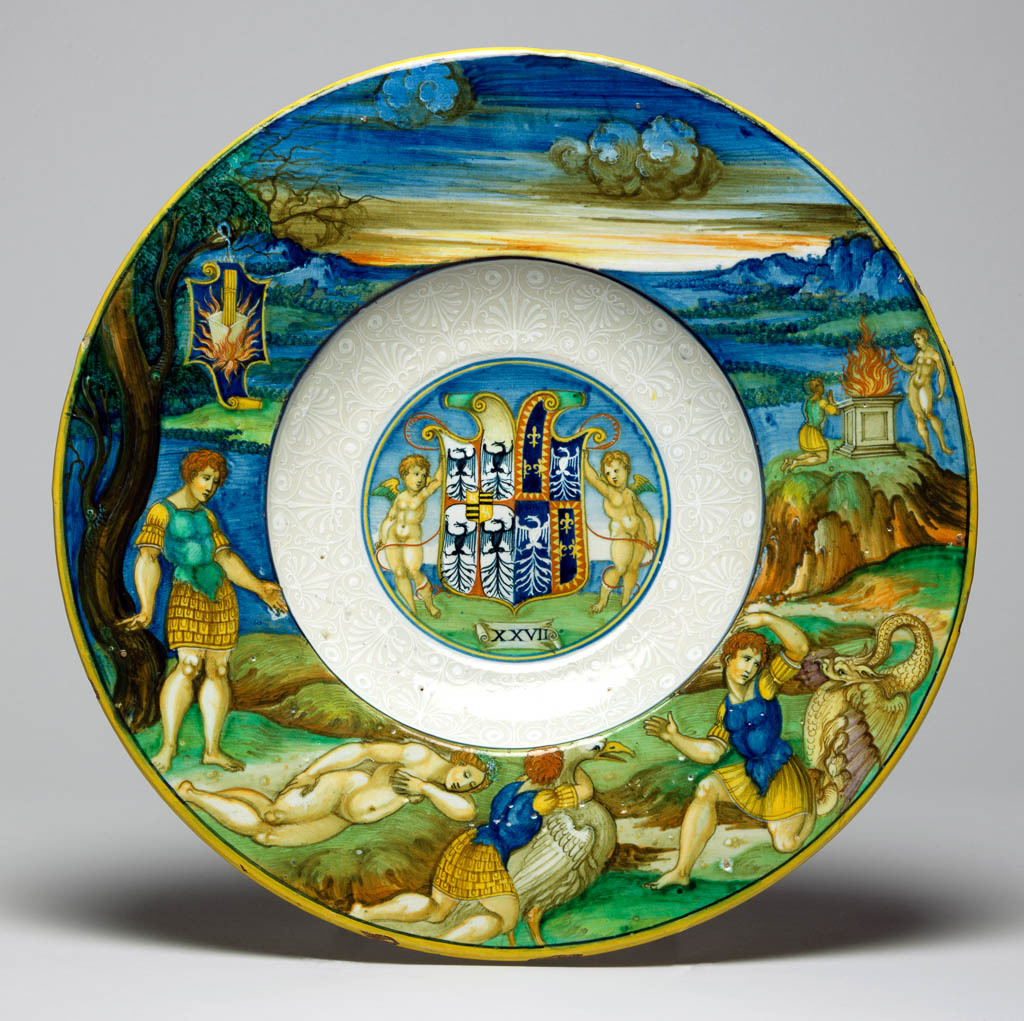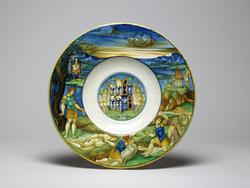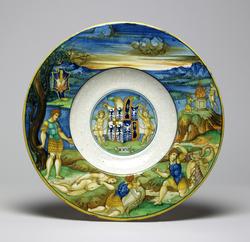Current Location: Gallery 7 (Courtauld)
Titles
Dish from the Isabella d'Este Service
Maker(s)
Painter:
Nicola di Gabriele Sbraghe da Urbino
Entities
Categories
Description
Maiolica dish, painted in polychrome with, in the well, the arms of Gonzaga impaling Este, and, on the rim, Peleus and Thetis.
Earthenware, tin-glazed overall; the reverse pale beige and speckled. Painted in blue, green, yellow, orange, stone, brown, manganese-purple, black, and white. Shape 56 (Poole 1995). circular with broad, almost flat rim, and deep well; the underside of the rim moulded with three bands of reeding.In the well, within narrow blue and yellow concentric circles, two putti support a shield charged with the arms of Gonzaga impaling Este: argent, a cross patty gules cantoned by four eagles displayed sable (Gonzaga modern granted 1433), an escutcheon overall, quarterly, 1, 4, gules a lion rampant argent (Bohemia), 2, 3, barry of six or and sable (Gonzaga ancient) impaling Este, quarterly, 1, 4, azure three fleurs-de-lis or a bordure indented gules, 2, 3, azure an eagle displayed argent (gules shown orange throughout). Below on a scroll is the impresa `XXVII'. The sides are decorated in bianco sopra bianco with palmettes and scrolls, and a blue line encircles the shoulder. The rim is decorated with Peleus and Thetis. Peleus stands beneath a tree, gazing at Thetis, who sleeps nude on the ground in front of him. Further to the right she is transformed into a swan-like bird as he embraces her, and then into a dragon from which he turns away in horror. Higher up on the right, a goddess appears to Peleus who kneels before an altar. In the distance there is a mountainous landscape and sky. Suspended from the tree there is a shield of testa di cavallo form charged with the impresa of gold rods in a crucible surrounded by flames in a blue ground. The edge is yellow. On the back there is a narrow yellow band round the base and a wider band on the edge.
Notes
History note: A member of the Rothschild family, Paris; Charles Damiron, Lyon; Sotheby's, 16 June 1938, Catalogue of the very choice collection of old Italian maiolica and Hispano-Moresque ware the property of Monsieur Damiron, 8 vue Vaubecour, Lyons, p. 63, lot 63.
Legal notes
Purchased with the Glaisher fund
Measurements and weight
Height: 3.9 cm
Acquisition and important dates
Method of acquisition: Bought
(1938-06-16)
by
Sotheby's
Dating
1520s
Renaissance
Circa
1524
CE
-
1525
CE
Note
The potter, Nicola di Gabriele Sbraghe, known as Nicola da Urbino, was a workshop owner in Urbino from at least 1520 until his death at the end of 1537 or in January 1538. He was also a brilliant maiolica painter, whose work has been identified by comparison with five pieces of istoriato maiolica monogrammed or signed by him. Nicola painted in an exquisitely delicate manner, and was unusually imaginative in his adaptation of printed sources and in the creation of architectural and landscape backgrounds. His output of the 1520s, which includes several armorial services, is regarded as the acme of maiolica decoration.
This exquisite dish formed part of a service which belonged to Isabella d'Este (1474-1539), widow of Francesco Gonzaga, fourth Marchese of Mantua (1466-1519). It was made between 1522 and 1525, and may have been the service given to Isabella probably in November 1524 by her daughter, Eleanora, Duchess of Urbino, who thought that she might like to use it in her villa at Porto near Mantua. Twenty-two dishes and one fragmentary dish are known, two decorated with biblical scenes and the rest with subjects from classical mythology or history. Each dish also bears the arms of Gonzaga impaling Este, and one or more of Isabella's imprese (a device or emblem) or her initials YS intertwined. On this dish the arms are surrounded by bianco sopra bianco decoration, and the rim is decorated with the story of Peleus and Thetis from Ovid's Metamorphoses, Book XI. Having found the sea goddess Thetis asleep on the shore, Peleus entreated her to make love, but she refused and escaped by transforming herself into different forms. After praying to the sea god Proteus for advice, Peleus successfully overcame the goddess's scruples and she conceived the ill-fated hero, Achilles. Nicola based the figures on a woodcut illustration in Giovanni dei Bonsignori's Ovidio methamorphoseos vulgare, Venice (Giovanni Rosso da Vercelli for Lucantonio Giunta), 1497 or a later edition. Two imprese are shown: `XXVII' sounding like vinti sète, (you are defeated), and gold bars in a crucible, which Isabella's husband adopted in 1495 to signify his integrity after successfully withstanding an accusation of treachery.
School or Style
Renaissance
People, subjects and objects depicted
Components of the work
Decoration
composed of
high-temperature colours
( metallic oxide colours)
Rim
Diameter 30.2 cm
Materials used in production
Tin-glaze
Earthenware
Techniques used in production
Throwing
: Earthenware, tin-glazed overall; the reverse pale beige and speckled. Painted in blue, green, yellow, orange, stone, brown, manganese-purple, black, and white high-temperature (metallic oxide) colours
Tin-glazing
Turning
Inscription or legends present
Inscription present: Rectangular with cut corners, printed in black `UNION/CENTRALE' and inscribed in faded black ink with `155/3657' between the two words
- Text: 'UNION/1555/3657/CENTRALE'
- Location: On the back
- Method of creation: Printed in black and inscribed in faded black ink
- Type: Label
References and bibliographic entries
Related exhibitions
Identification numbers
Accession number: EC.30-1938
Primary reference Number: 47188
Stable URI
Audit data
Created: Saturday 6 August 2011
Updated: Thursday 15 May 2025
Last processed: Thursday 15 May 2025
Associated departments & institutions
Owner or interested party:
The Fitzwilliam Museum
Associated department:
Applied Arts

 IIIF Manifest
IIIF Manifest






